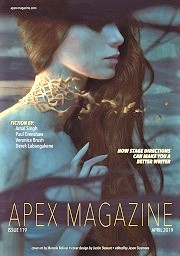“Professor Strong and the Brass Boys” by Amal Singh
Reviewed by Victoria Silverwolf
Three science fiction short stories and one fantasy novelette appear in the latest issue of this Hugo-nominated publication.
“Professor Strong and the Brass Boys” by Amal Singh is narrated by a robot that teaches history to human students. One day, a student asks what robots do for leisure. This is a new concept for the machine, as humans treat robots only as servants. The teacher discovers a kitchen robot that bangs on pots and pans as if they were drums. Intrigued by the possibilities of music, it purchases a lute from a street performer. With others of its kind, it makes a symbolic musical gesture in defiance of its human masters.
The author creates a convincing nonhuman narrator. The oppressed robots rebel in an artistic, nonviolent way, which is a refreshing change of pace. Adding to the verisimilitude of the story is the fact that many robots are other than humanoid in shape. A small but effective touch is the use of new pronouns for the genderless machines.
“All Votes Will Be Counted (We Promise)” by Paul Crenshaw is a satiric tale set in the near future. North and Central America are one giant nation. Adult citizens are required to vote, using paper ballots, several times a week. The issues are often trivial, such as replacing the word “war” with the phrase “advanced hostilities between formerly friendly countries.” The protagonist, fed up with wasting his time this way, refuses to vote “yes” or “no.” Instead, he writes a disgusted comment on the ballot. This leads to an escalating series of conflicts with a government that insists he vote the way it wants him to.
Anyone frustrated by governments that are often not as democratic as they claim to be will appreciate the author’s intent. Even for a satire, however, there is a lack of believability. Although the story takes place in the future, the setting seems more like the middle of the last century. Many details, such as the uniting of multiple nations into single entities, are neither plausible nor relevant to the theme.
Like the first story, “Face” by Veronica Brush is narrated by a robot. The man who creates it calls himself its father. The robot remains in a single small room when not working in the man’s factory. Once a year, on what the man calls its birthday, the robot is allowed to ask one question. When it learns that it is humanoid in appearance, it becomes curious about its face. Deprived of a mirror, it attempts to discover what it looks like, leading to tragedy.
This sad tale has strong emotional power, as the reader comes to sympathize with the robot’s yearning to know itself. It concludes with a twist ending, which is not as effective as the rest of the story.
“A Fool’s Baneful Gallantry” by Ugandan author Derek Lubangakene is a sword-and-sorcery adventure set in a desert land. Three unlikely companions wander through the wasteland on a mysterious quest. They join a caravan and battle bandits. One of the trio, a magician, turns out to be something very different from what the others expected.
The author creates a complex fantasy world, full of vivid and imaginative details. Unfortunately, much of this remains confusing, as the reader is thrown into the middle of things with little understanding of what went on before. Some of the writing is awkward. Although the style is the typical formal, slightly archaic one often found in such fiction, at one point a character says “okay,” ruining the mood and destroying the suspension of disbelief.
Victoria Silverwolf also writes for Galactic Journey, nominated for the Best Fanzine Hugo this year.
 Apex #119, April 2019
Apex #119, April 2019